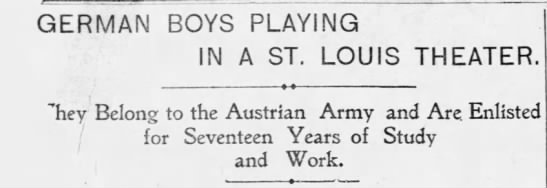German Boys Playing in a St. Louis Theater
They Belong to the Austrian Army and Are Enlisted for Seventeen Years of Study and Work.
St. Louis Dispatch, St. Louis, Missouri. April 3, 1898
Published at DVHH.org 29 May 2020 by Jody McKim
Pharr
... the whirl of talk about war with Spain, the name of Austria is occasionally mentioned, and it may be interesting to St. Louisans to know that a
small
detachment of the Austrian Army at present in the city. It is not here ....th any warlike intentions, however, nor does it belong to the fighting branch of the army. The detachment comprises only musicians, and these musicians constitute the Kaiser Franz Josef's Magyar Hungarian Knaben Kapelle, or Hungarian Boys' Band.
None of the boys is over 14 years old, and majority are but 8 or 10. It may seem ...lous, therefore, to say that these boys are members of the regular army, but they are as truly so as the cadets at West Point are a part of the military forces
this country. The tiny musicians are cadets at the military training school at Billid, Hungary,
and were enlisted at the age of 4 for a period of 18 years, 14 of which spent at the training school In the ...y of music and four in the regular ...ds of the army. The boy's life in this country 13 practically the same as it
would be if they were in school in their own land. The strictest discipline Is maintained, and despite the .. hours of study and the two concerts a day which they are obliged to play, the boys are all healthy and happy. They are precisely neat about their person and ....seen on the street with so much of speck of dirt on their natty blue uniform nor without their shoes carefully polished heel to toe.
Hungarians these boys are called, but only that in name, and by reason geographical accident. They were born of German parents, look German and speak only German.
They were nearly all born in Billid, a Saxon settlement of about 6000 souls, situated 200 miles south of Buda-Pesth and 20 miles north of the Servian border.
The school to which this little boys band belongs is situated here and Is a comparatively modern Institution, being only about two centuries old. It is called the Kaiser Franz Josef Militair Kappellen Schule,
and from it such men as Czibulka and Komzak, the great Hungarian composers, and Neuner and Muller, famous all over the old world as conductors, have graduated. The school has a splendid site on a high bluff on the bank of the River Marosch and is maintained by the Government.
There are about 200 pupils in the school, and it was from the best of these that the band at the Columbia was chosen. The boys' life in this country is practi-letter (could
have meant to be "practical"), they never quarrel, are loyal and brave as little lions and music Is their very life. Their fathers are educated men of the higher middle classes, many of them being musicians in the army.
In Billid the men still wear knee breeches and three-cornered hats and the streets of the town are so narrow that one might reach out the window and shake hands with his neighbor across the street. None of the boys had ever been out of Hungary before, few beyond the limits of strange old Billid
and this trip Is ono succession of surprises to them. The baby of the band, Mikel Braunn,
the 6-year-old drummer, is about the only one who doesn't enjoy it. He Is a sturdy little fellow, deeply impressed with his dignity as a soldier, and to his infantile mind it doesn't become him to be the pet of the ladles, which he is.
Adam Laut,
a stout little fellow of 10 years, is the only In the band who enjoys American cooking. He has become a voracious eater since his arrival here and Director Schilzonyi avers that he outgrows a new uniform every week. Adam, plays the helicon, an Instrument almost as large as his own small body.
The boys get plenty of exercise every day while en tour. Although nearly 5000 miles away from borne the school discipline Is over them still. They are out of bed at 6:30 o'clock; breakfast at 7; band study from 8 to 11; athletic exercise from 11:30 to 12:30; lunch at 1; school from 4 to 6; dinner
at 7; then to the theater at 3 in the afternoon and 9 In the evening to play American marches and Italian operas and the home music, the melodies and czardas of far-off Hungary. The band is in charge
of Niklas Schilzonyi. He Is only 22 years old, but he is already known in his own land as a composer and conductor of much ability. He is himself a graduate of the school at Billid and was director of one of Hungary's most famous bands, the Staats Kapele, at Buda-Pesth at the age of 19. He is now principal instructor of of the school and is still in the army service. He has absolute charge of the boys' musical education, and the results he has thus far achieved speak well for his ability.
The make-up of the band differs from other brass organizations. There are no cornets, but fluegelhorns in place of them. Then again, the trombones, instead of sliding in and out, are operated by a valve, the regular army trombone. There are three instead of four French or wald horns and two F
clarinets la place of flutes. 
|